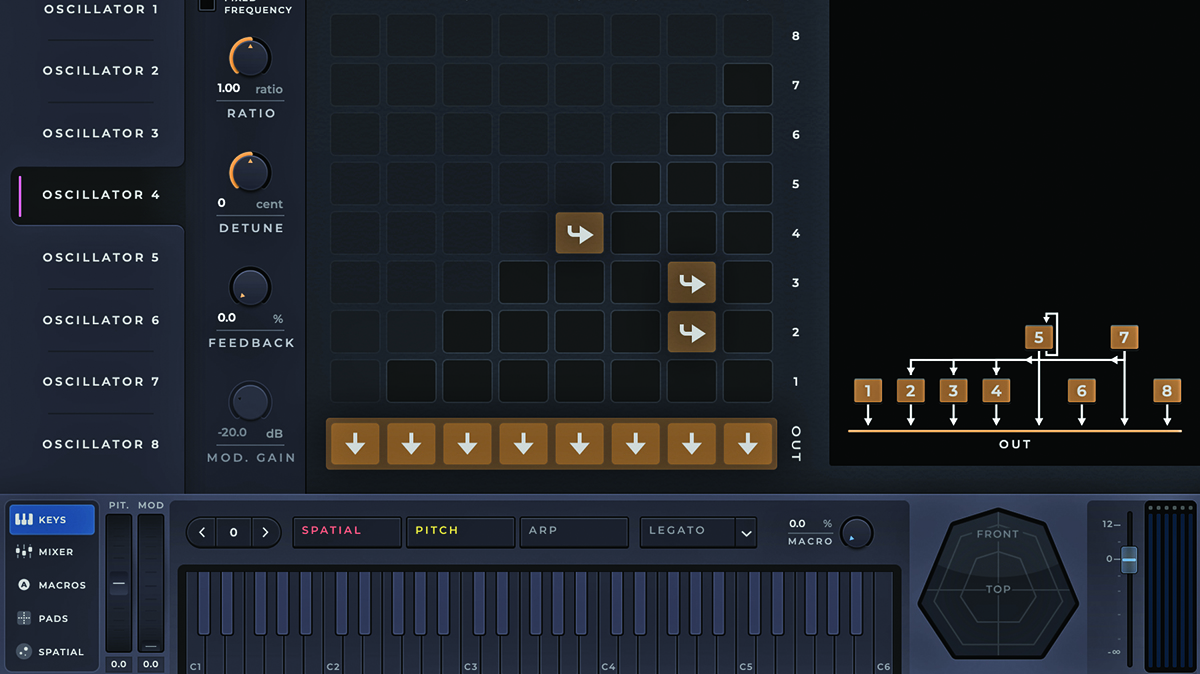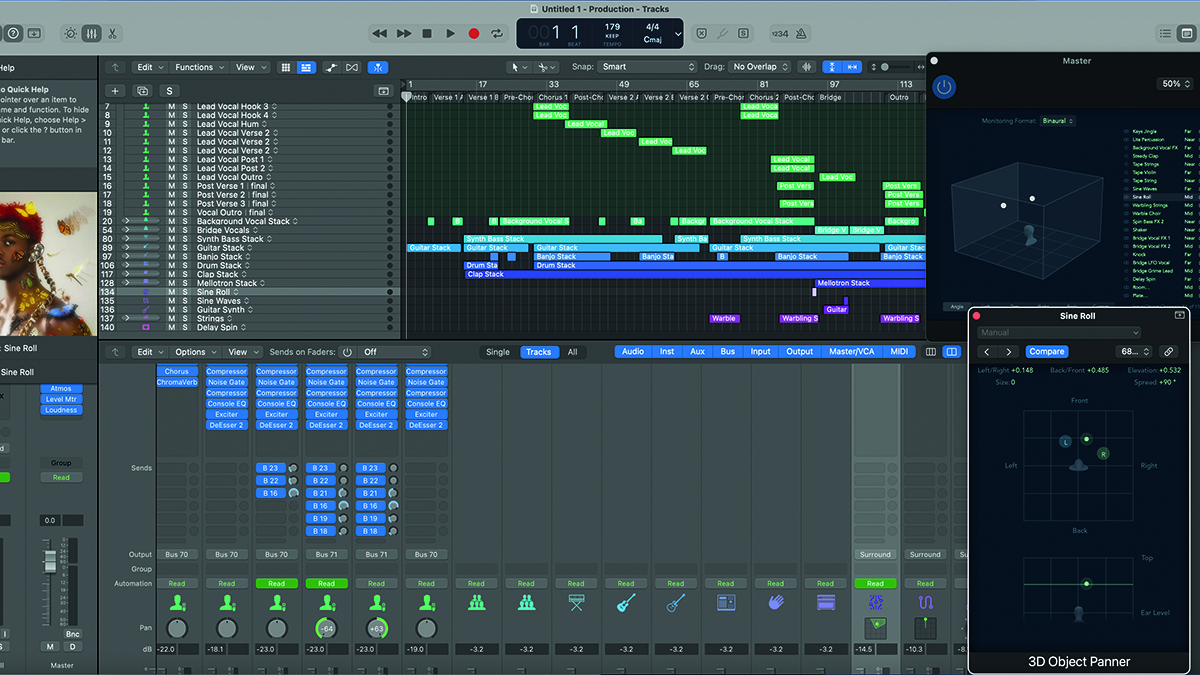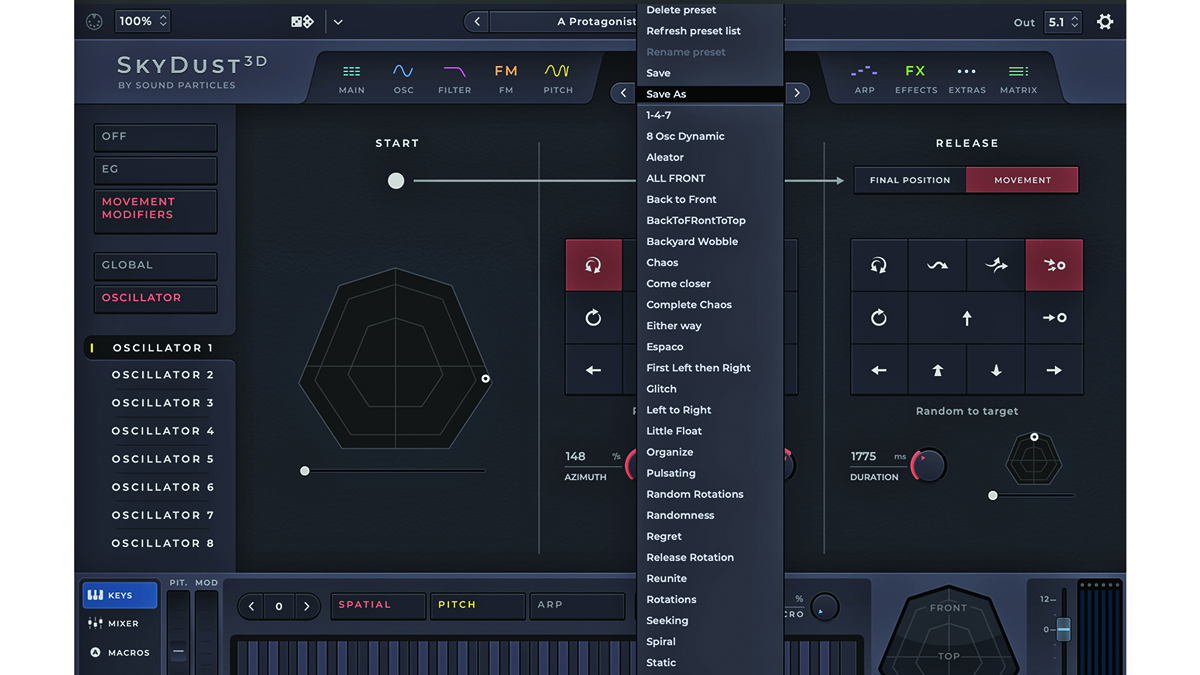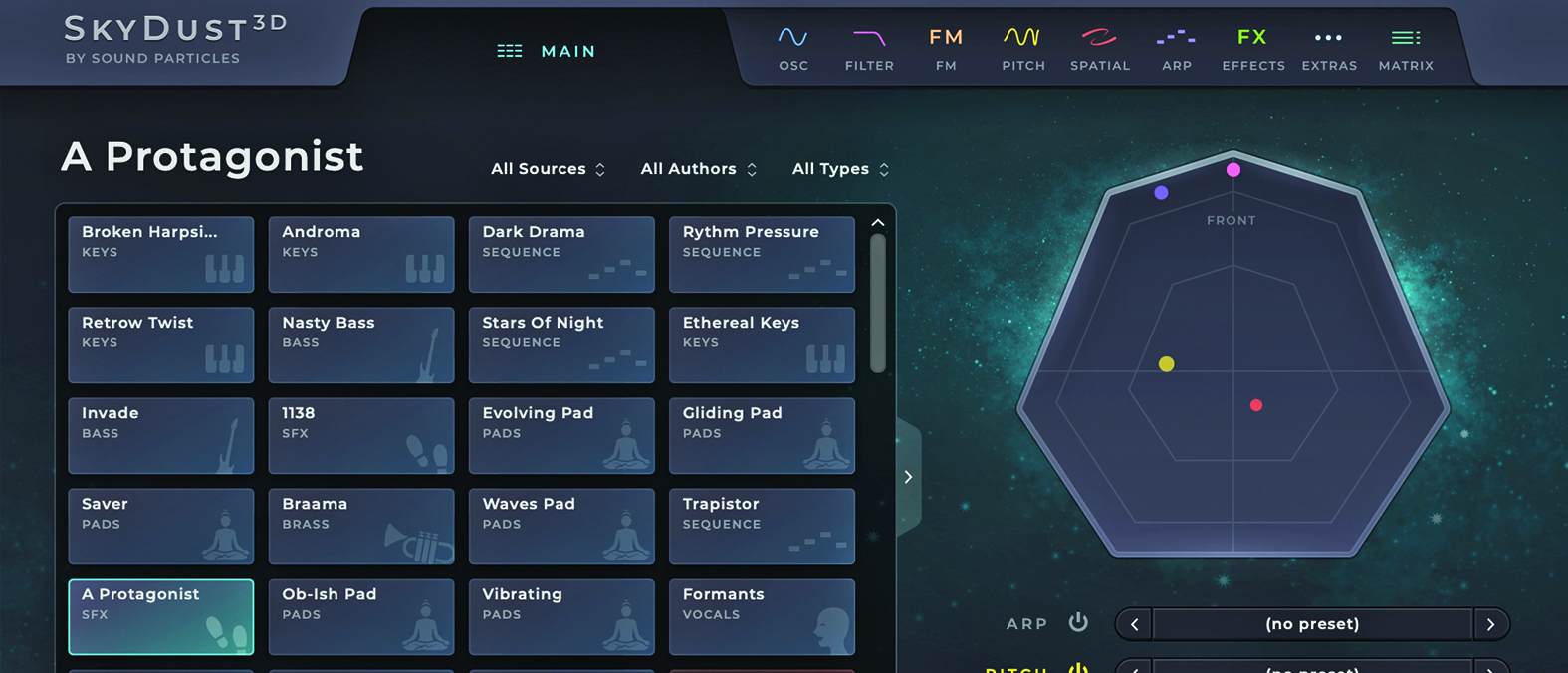MusicRadar Verdict
An impressive synth even in the stereo version, the full SkyDust 3D really is innovative and impressive stuff.
Pros
- +
Surprisingly easy to use.
- +
Amazing sound design potential.
- +
Great synth power.
- +
Innovative design.
Cons
- -
Exercise restraint with your surround experiments for best results.
- -
Quite expensive.
MusicRadar's got your back
Sound Particles SkyDust 3D: What is it?
System Requirements: Mac OSX 10.13 or higher, Intel, and native Apple Silicon Macs. Windows 10 or higher. 2-core or higher CPU. 4GB RAM. 1.3GB disk space.
Buy at Plugin Boutique
Sound Particles might not be a name you’ve heard of but earlier this year, the brand announced one of the most exciting products of the NAMM show: a ‘first ever’ 3D synth in the form of SkyDust 3D.
As you may have guessed, we’re talking spatial audio here but we’re not just talking spinning sounds floating around your head (although that is an option). What we have is a synth that can be used ‘normally’ but can also apply a heap of modulation options to your sound’s position in space, and alter those positions over time.
So we’re talking both ‘time and space’ – not many synths can boast that! And if Jean-Michel Jarre is keen on the concept (he calls it “the first musical instrument for immersive sound”) then we’re obliged to boldly go where no synth has gone before…

Sound Particles SkyDust 3D: Performance and verdict
Before we get too ‘immersed’ though, we should give you a quick overview of SkyDust’s main synth architecture, which is pretty impressive without even considering the spatial side of it.

• Apple Logic Pro
There’s little out there to match SkyDust 3D but Logic and its synths will get you there (and costs less!).
• Envelop
Similarly, Envelop is an open source plugin for Ableton Live that delivers some spatial power.
You get eight oscillators, each with 16 waveforms to choose from, and these can be layered together for some impressively fat, analogue-style sounds. Or you can choose to have each modulate another, with an easy grid system used to select which oscillators are modulating which. Just this in itself could send you to an FM world of sound design experimentation for hours.
SkyDust uses an easy tab system of ten different options including how to set up the aforementioned oscillators and that FM grid. You also get tabs for filters (for each oscillator – with six to choose from), sequencing, arpeggiation and effects. Already we can see that this is a synth with an impressive engine at its heart.
But this is where it gets even more interesting, because under the Spatial tab you can assign each of the oscillator’s positions and how they move within your surround sphere. You can do this using a set of around 30 presets (‘Back To Front’, ‘Rotations’ etc), or create your own movements. Breaking it down even further, you can even create and use individual movement presets which operate each oscillator.
Want all the hottest music and gear news, reviews, deals, features and more, direct to your inbox? Sign up here.
If all of this sounds complicated it’s actually not considering what you are doing. This is more often than not because how you are shaping the oscillators is visually illustrated in a handy graphic of your surround space. Each of the eight oscillators is revealed in different colours so you can easily see their respective positions. Thos familliar with Dolby Atmos software should feel quite comfortable.
The best thing, however, is that each of these movements can also be assigned to a modulation source (sequencer, LFO and more) so you have total control over not only where your oscillators are going, but how long it takes them to get there.

So is it a bit cluttered then?
With so much time spent explaining the concept, here are the results of all of that sound mangling in time and space. Starting with the presets and you do get an impressive range that veer from very cinematic – not surprising given Sound Particles’ involvement in producing 3D sound for film – to absolutely thunderous analogue. And while some are a bit too ‘trailer’, with lots of things going on that really suit (and are designed to demo) that 3D movement, SkyDust is very much about designing your own sounds.
But there is the niggling question of: is having all of this movement a bit distracting? Yes and no. We found a lot of the presets to be less about spinning and more about gentler effects, and this is where all surround (and indeed music production) benefits very much from ‘less is more’. While you could spin your sounds from one end of your space and time forever, that would quickly take over your mixes, so do bear that in mind. Restraint!
The next generation
It’s worth pointing out that you can get SkyDust as a (£166) stereo/binaural version where you’ll enjoy some 3D effects or go for the full (£333) surround option that covers everything from 5.1 to 9.1.6 (get your speakers out) and includes Dolby Atmos support.
That £333 version is expensive (although as we write this, both versions are on offer), so you might want to consider the cheaper one if your speaker arrays are less impressive than your local Odeon’s. In fact SkyDust is pretty impressive on its own terms as a stereo/binaural synth. The full SkyDust 3D, however, is more about designing sounds ‘all… around… you’ as your local flicks will say. And it does it superbly, surprisingly easily and with the kind of aplomb that other developers will surely seek to emulate.
MusicRadar verdict: An impressive synth even in the stereo version, the full SkyDust 3D really is innovative and impressive stuff.
Sound Particles SkyDust 3D: The web says
"The worlds of analogue and FM synthesis are combined in a very elegant manner providing huge scope for creative sound design. Bring in the 3D movements that can be applied to the individual voices and you have an instrument that is genuinely unique."
Sound On Sound
Sound Particles SkyDust 3D: Hands-on demos
Sound Particles
Michael G Wagner
VIRAL BEATS
Sound Particles SkyDust 3D: Specifications
- System Requirements: Mac OSX 10.13 or higher, Intel, and native Apple Silicon Macs. Windows 10 or higher. 2-core or higher CPU. 4GB RAM. 1.3GB disk space.
- Buy at Plugin Boutique
Computer Music magazine is the world’s best selling publication dedicated solely to making great music with your Mac or PC computer. Each issue it brings its lucky readers the best in cutting-edge tutorials, need-to-know, expert software reviews and even all the tools you actually need to make great music today, courtesy of our legendary CM Plugin Suite.

